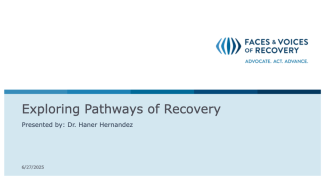Webinar reflection: Exploring Multiple Pathways of Recovery

ISSUP, in collaboration with Faces & Voices of Recovery, has launched a new Global Recovery Network webinar series to spotlight diverse perspectives on recovery. The first webinar featured Dr. Haner Hernández, a respected expert in the field and a person in long-term recovery. Dr. Hernández currently serves as a Senior Consultant to the Massachusetts Department of Public Health and plays a key role in advancing health equity, workforce development, and recovery support. His presentation provided an insightful and inclusive overview of multiple pathways to recovery, grounded in both professional expertise and lived experience.
Dr. Hernández guided attendees through a range of approaches geared towards supporting recovery, including self-management, traditional healing practices, mutual aid, faith, and spirituality-based recovery, comprehensive case managed care incorporating behavioural interventions, medication-assisted treatment, and peer-led models. He examined how recovery is influenced by cultural, social, economic, and systemic factors, and stressed the need for strategies that are both culturally responsive and person-centred. Importantly, he highlighted how stigma, discrimination, and violations of human rights can act as barriers to recovery. The session offered practical ideas for supporting recovery in various settings, particularly for practitioners who are themselves in recovery, and encouraged attendees to think critically about how to promote inclusive and empowering systems of care.
The webinar was characterised by excellent participant engagement, with arising questions and discussion reflecting the diversity of the ISSUP network. Attendees demonstrated a shared understanding that recovery is not simply about abstinence, but rather a holistic and continuous journey of healing, self-realisation, and social reintegration. Participants shared insights and asked thoughtful questions about how to support recovery at individual, community, and policy levels.
A number of key themes emerged from the discussion.
- Participants embraced a holistic view of recovery that encompasses physical, mental, spiritual, and social wellbeing, as well as access to education, employment, and housing. Reflections appraised recovery as an evolving process that varies across contexts and between individuals.
- There was strong interest in the role of culture, spirituality, and lived experience. Attendees recognised the value of religious and spiritual practices and storytelling in recovery, and advocated for their integration into care systems.
- Several participants highlighted policy and structural challenges, including legal mandates from drug courts, limited funding for youth recovery programmes, comprehensive demonstrable case management, and restrictions around opioid substitution therapies like methadone. These concerns raised important questions about the need to balance legal and clinical frameworks with a rights-based, person-centred approach.
- The importance of involving families and communities in recovery was widely acknowledged. Participants discussed therapeutic strategies, training initiatives, and community-based interventions such as horticulture therapy and behavioural couples therapy as ways to support sustainable recovery.
- Several questions addressed professional practice, including the impact of language and stigma, the role of recovery capital, and how to promote compassionate, evidence-informed approaches within institutions. The conversation reinforced the need for continued dialogue, capacity building, and knowledge exchange to foster more inclusive, effective, and dignified responses to substance use and recovery across global contexts.
Some specific questions that arose from the Q&A include:
- Where does religious intervention stand relative to the role of medical professionals in supporting recovery?
- How effective is storytelling from individuals with lived experience in promoting recovery?
- How can drug courts better balance legal requirements with long-term recovery goals?
- What are some strategies to support individuals in contact with the criminal justice system re-entering society with regard to substance use?
- How can families be more meaningfully involved in an individual’s recovery journey?
- Can training for parents be provided when a child is undergoing therapy?
- Why do some individuals with opioid use disorder sustain recovery without medications, while others do not?
- How do we combat stigma and misinformation in small island or tightly-knit communities?
- What is the impact of heroin on immunocompromised or transplant patients?
- What role does neutral and non-stigmatising language play in facilitating recovery?
The rich discussion and thought-provoking questions from this first webinar have laid a strong foundation for the rest of the series. We hope the ideas shared will spark ongoing reflection, deeper learning, and renewed commitment to inclusive and impactful recovery support. This is just the beginning. We invite you to look out for and join us for the upcoming sessions as we continue to explore the many dimensions of recovery and how we can strengthen our collective efforts to support individuals and communities.